Dacia Spring vs Hyundai Inster – erot ja hinnat vertailussa
Vertaa tehoa (100 hv vs 115 hv), tavaratilaa ja hintaa (17600 € vs 24900 € ) yhdellä silmäyksellä. Kumpi auto on sinulle parempi valinta, Dacia Spring vai Hyundai Inster?
Kustannukset ja kulutus
Hinnan ja tehokkuuden vertailussa erot tulevat usein selvimmin esiin. Tässä ratkaistaan, kumpi malli sopii paremmin budjettiisi pitkällä aikavälillä.
Dacia Spring on hinnassa merkittävä edullisempi – sen lähtöhinta on 17600 € , kun taas Hyundai Inster maksaa 24900 € . Ero on noin 7294 €.
Sähkönkulutuksessa etu on Dacia Spring:lla: se kuluttaa 12.40 kWh /100 km ja on pienessä määrin energiatehokkaampi kuin Hyundai Inster, jonka kulutus on 14.30 kWh. Ero on noin 1.90 kWh.
Sähköisessä toimintamatkassa Hyundai Inster suoriutuu ilmeinen paremmin: se yltää jopa 370 km:een, noin 145 km enemmän kuin Dacia Spring.
Moottori ja suorituskyky
Teho, vääntömomentti ja kiihtyvyys ovat autoharrastajien klassisia mittareita – ja erot tulevat tässä hyvin esiin.
Moottoritehossa Hyundai Inster on vähän etulyöntiasemassa – 115 hv verrattuna 100 hv:een. Ero on noin 15 hv hv.
Kiihdytyksessä 0–100 km/h Dacia Spring on vähän nopeampi – se saavuttaa 100 km/h ajassa 9.60 s, kun taas Hyundai Inster tarvitsee 10.60 s. Ero on noin 1 s sekuntia.
Myös vääntömomentissa näkyy ero: Hyundai Inster vetää kevyt voimakkaammin, 147 Nm verrattuna 137 Nm:een. Eroa on noin 10 Nm.
Tila ja käytännöllisyys
Perheauto vai arjen kumppani – kumpi tarjoaa enemmän tilaa, mukavuutta ja käytettävyyttä?
Molemmissa autoissa on tilaa 4 henkilölle.
Omapainossa Dacia Spring on selvästi havaittava kevyempi – 1070 kg verrattuna 1380 kg:een. Painoero on noin 310 kg.
Tavaratilan koossa Dacia Spring tarjoaa kevyt enemmän – 308 L verrattuna 280 L:een. Ero on noin 28 L.
Kantavuudessa Hyundai Inster on erottuva parempi – 357 kg verrattuna 274 kg:een. Ero on noin 83 kg.
Kuka voittaa datavertailun?
Dacia Spring vain pieni etu objektiivisessa datavertailussa.
Tämä arvio kertoo vain, kumpi malli kerää enemmän pisteitä paperilla – ei kumpi näistä kahdesta autosta tuntuu sinulle oikealta.
Kustannukset ja kulutus
Näytä yksityiskohtainen analyysi
Moottori ja suorituskyky
Näytä yksityiskohtainen analyysi
Mitat ja kori
Näytä yksityiskohtainen analyysi
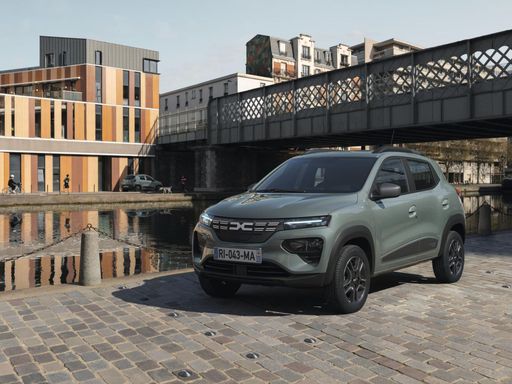
Dacia Spring
Dacia Spring
Dacia Spring on aloittelijaystävällinen kaupunkisähköauto, joka tarjoaa yksinkertaisella ja edullisella paketilla yllättävän käytännöllisyyden. Se ei yritä näytellä luksusta, mutta hoitaa arjen kulkemisen vaivattomasti ja hymyilee niille, jotka arvostavat järkeä enemmän kuin kiiltävää trimmiä.
Tiedot
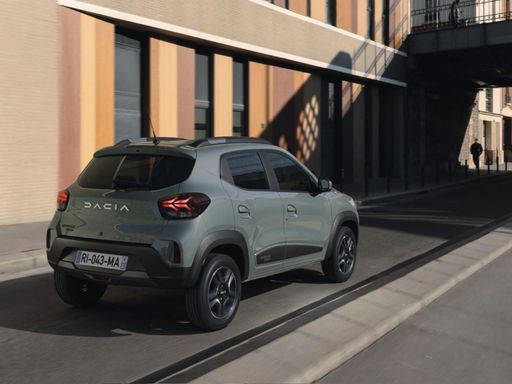
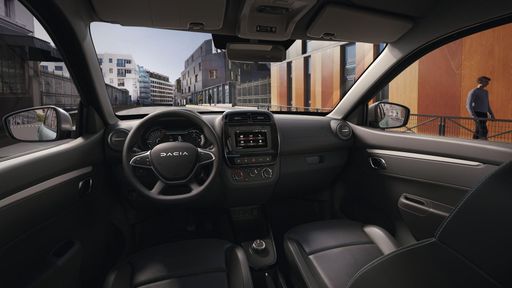
Hyundai Inster
Hyundai Inster tarjoaa modernia muotoilua ja arjen fiksuja ratkaisuja, jotka tekevät siitä helposti lähestyttävän vaihtoehdon ostajan listalle. Ajotuntuma on itsevarma ja sisällä viihtyy — pieni pilke silmäkulmassa kertoo, että tässä on tehty oikeita valintoja käyttömukavuuden ja tyylin välillä.
Tiedot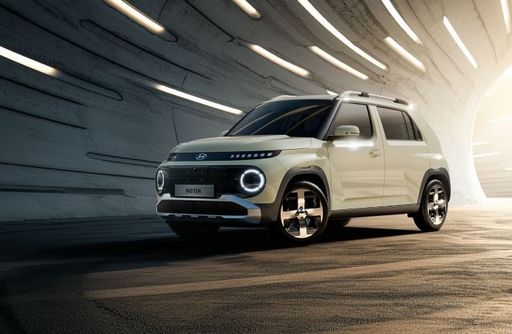
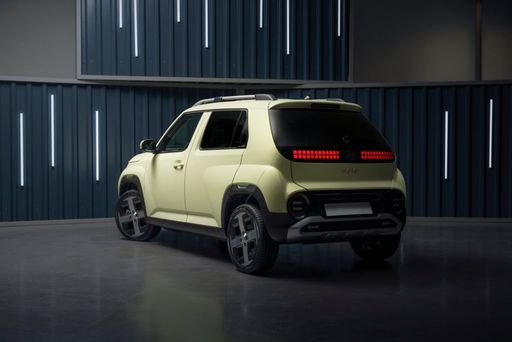
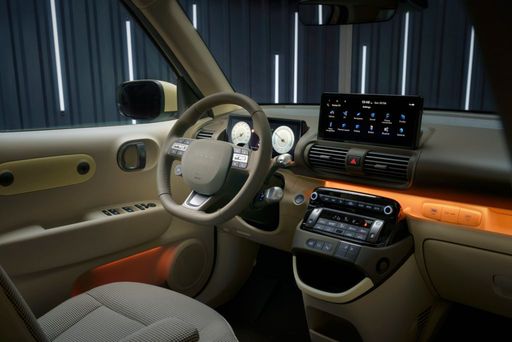
Kustannukset ja kulutus |
|
|---|---|
|
Hinta
17600 - 20500 €
|
Hinta
24900 - 31400 €
|
|
Kulutus L/100km
-
|
Kulutus L/100km
-
|
|
Kulutus kWh/100km
12.4 - 12.7 kWh
|
Kulutus kWh/100km
14.3 - 15.1 kWh
|
|
Sähköinen toimintasäde
221 - 225 km
|
Sähköinen toimintasäde
327 - 370 km
|
|
Akun kapasiteetti
-
|
Akun kapasiteetti
-
|
|
CO2
0 g/km
|
CO2
0 g/km
|
|
Polttoainesäiliön tilavuus
-
|
Polttoainesäiliön tilavuus
-
|
Mitat ja kori |
|
|---|---|
|
Kori
SUV
|
Kori
SUV
|
|
Istuimet
4
|
Istuimet
4
|
|
Ovet
-
|
Ovet
-
|
|
Omamassa
1070 kg
|
Omamassa
1380 - 1433 kg
|
|
Tavaratila
308 L
|
Tavaratila
238 - 280 L
|
|
Pituus
-
|
Pituus
-
|
|
Leveys
1583 mm
|
Leveys
1610 mm
|
|
Korkeus
-
|
Korkeus
-
|
|
Maksimi tavaratila
-
|
Maksimi tavaratila
-
|
|
Kantavuus
274 kg
|
Kantavuus
317 - 357 kg
|
Moottori ja suorituskyky |
|
|---|---|
|
Moottorityyppi
Sähkö
|
Moottorityyppi
Sähkö
|
|
Vaihteisto
Automaatti
|
Vaihteisto
Automaatti
|
|
Vaihteiston lisätiedot
Alennusvaihteisto
|
Vaihteiston lisätiedot
Alennusvaihteisto
|
|
Vetotapa
Etuveto
|
Vetotapa
Etuveto
|
|
Teho hv
70 - 100 hv
|
Teho hv
97 - 115 hv
|
|
Kiihtyvyys 0-100 km/h
9.6 - 12.3 s
|
Kiihtyvyys 0-100 km/h
10.6 - 11.7 s
|
|
Huippunopeus
-
|
Huippunopeus
-
|
|
Vääntömomentti
137 Nm
|
Vääntömomentti
147 Nm
|
|
Sylinterien lukumäärä
-
|
Sylinterien lukumäärä
-
|
|
Teho kW
52 - 75 kW
|
Teho kW
71 - 85 kW
|
|
Iskutilavuus
-
|
Iskutilavuus
-
|
Yleistä |
|
|---|---|
|
Mallivuosi
2025
|
Mallivuosi
2025
|
|
CO2-tehokkuusluokka
A
|
CO2-tehokkuusluokka
A
|
|
Merkki
Dacia
|
Merkki
Hyundai
|
Millaisia voimalinjoja Dacia Spring:ssa on saatavilla?
Dacia Spring on saatavilla Etuveto-vetotavalla.
